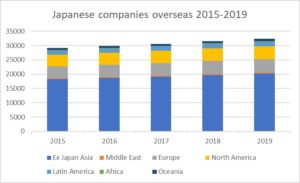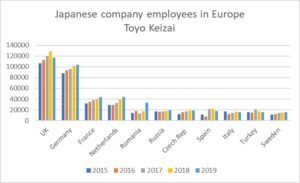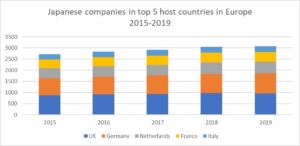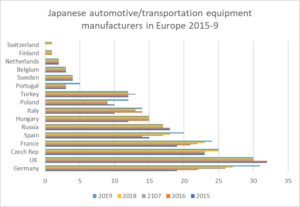Makihara Minoru
I was sad to hear of the death of Makihara Minoru, former president of Mitsubishi Corporation, on 13th December 2020. He was my daisempai (most senior mentor) – both tough and supportive to work for. A wise visionary on globalization, he was progressive in his attitude towards women and non-Japanese employees in Mitsubishi Corporation and spoke elegant, fluent mid-Atlantic English. He was the ultimate Mitsubishi shinshi (gentleman).
I have taken some extracts from my book on the history of Mitsubishi Corporation in London as a tribute to him:
London – 1959 – “If you were your father, you would not have done this”
In 1959 Makihara Minoru was posted to London to take over the tinned salmon, crab and mandarin orange business. He was the son of Makihara Satoru, who was the General Manager of the London branch from 1939 to 1940 and also was in charge of the tinned salmon and crab business in London from 1927 to 1937. ‘I did business with many of the people that my father did business with. They remembered my father very fondly and were always telling me “if you were your father, you would not have done this…”‘ One such business partner was Dan Tobey, of Unilever, the largest single customer of Mitsubishi for tinned salmon. The rest of the tinned salmon was done through the same brokers as before the war, Anderson & Colman. Mr Colman had also been a friend of Makihara senior. One of Anderson & Colman’s largest customers was Princes Foods, whom Mitsubishi Corporation was to acquire in the 1980s.
Mitsubishi Corporation was the dominant supplier from Japan to the UK of tinned salmon and Japan was still the main supplier of tinned salmon to the UK in the 1960s.
The Japanese community in London in the 1960s
Makihara Minoru was in London until 1967. Despite the tripling of the number of Japanese resident in the UK during the 1960s, according to Makihara “there were still too few Japanese in London to feel that there was a community.” The 1000 residents barrier was broken by the late 1960s, and just as before the war, Japanese restaurants began to appear in London. The lifting of travel restrictions by the Japanese government also stimulated tourism and business travel from Japan to London. Up until then, Mitsubishi’s Japanese employees had to improvise, trying to find Chinese restaurants that most suited Japanese tastes.
Despite the lifting of travel restrictions Makihara only returned to Japan once in the eight years he lived in the UK, and made an international phone call to Japan just once a year.
Half of the Japanese Mitsubishi staff lived in South London and half in the North. Hampstead (where the Makiharas had lived before the war) and Finchley had become popular amongst Japanese, known as J&J town (Jewish and Japanese) but Makihara chose Purley. “Because my superior Mr Itoh had decided to seek other directions and had moved to East Croydon. I thought this was a very good choice – the rent was reasonable and the surroundings were much better. We moved twice but always stayed in Purley – the houses had nice gardens and were very superior by Japanese standards. The travelling time was about the same as from Hampstead.” They sent their two children to St David’s School, a small co-educational school in Purley.
Bridging the division between local and Japanese staff
According to Makihara Minoru, there was no clear division of roles between Japanese and British staff in Marine Products Department and the Japanese and British staff would visit the brokers together.
There was, however, inevitably some friction between the Japanese and British staff. In Makihara’s view, this arose for two reasons: differences in style of work and differences in native language.
“As far as style of work was concerned, while the Japanese staff tend to work together and share information, which is the basic foundation of a general trading company, the British staff would tend to guard their territory and, on occasion, be unwilling to share information with others, even when that would have enhanced the business. This fact was aggravated by the language barrier. Even when Japanese staff were carrying out a normal conversation in Japanese, some suspicious British staff would imagine that they were being talked about behind their backs. Telexes used to come from Japan mainly in Japanese, which was another source of friction. I frequently requested Tokyo that telexes be sent in English but this was mostly in vain, and as a result, a lot of the time of the Japanese staff was taken up by translating telexes into English.”
In order to overcome the language barrier, Makihara started a japanese class for the British staff, but most of the senior men dropped out, leaving Makihara with five of the female staff. His efforts lasted for about two years. “I was finding it increasingly difficult to prepare material and texts for the British staff. Japanese is virtually without grammar, and it is an extremely difficult language to learn.”
Makihara Minoru, born 1930 Hampstead, London. Harvard University BA 1954. Joined Mitsubishi Corporation in 1956. President of Mitsubishi Corporation 1992-1998
For more content like this, subscribe to the free Rudlin Consulting Newsletter. 最新の在欧日系企業の状況については無料の月刊Rudlin Consulting ニューズレターにご登録ください。
Read More

 Within Europe, the number of people employed by Japanese companies rose 18% from 2015 to 2019. Those countries where the number of Japanese company employees has fallen are countries where there has been a rise in populism, civic unrest and political risk. UK employee numbers fell 9% 2018-9 (the first decline since at least 2015), Spanish employee numbers fell 19% 2018-9, Hungary’s fell 18%, Turkey’s 10%, Poland and Italy also showed small decreases in employee numbers.
Within Europe, the number of people employed by Japanese companies rose 18% from 2015 to 2019. Those countries where the number of Japanese company employees has fallen are countries where there has been a rise in populism, civic unrest and political risk. UK employee numbers fell 9% 2018-9 (the first decline since at least 2015), Spanish employee numbers fell 19% 2018-9, Hungary’s fell 18%, Turkey’s 10%, Poland and Italy also showed small decreases in employee numbers. The number of Japanese companies in the UK has fallen by 1% 2018-9, from 972 to 966, the first drop since at least 2015, having risen 11% 2015-2018. France also saw a 2% drop in the number of Japanese companies, even though employee numbers are up. Germany attracted a 4% increase in Japanese companies from 2018-9, having risen 13% 2015-8. Netherlands had a 1% increase 2018-9 (13.5% 2015-8) and Italy had a 2% rise in Japanese companies 2018-9, and an increase of 11.8% 2015-8.
The number of Japanese companies in the UK has fallen by 1% 2018-9, from 972 to 966, the first drop since at least 2015, having risen 11% 2015-2018. France also saw a 2% drop in the number of Japanese companies, even though employee numbers are up. Germany attracted a 4% increase in Japanese companies from 2018-9, having risen 13% 2015-8. Netherlands had a 1% increase 2018-9 (13.5% 2015-8) and Italy had a 2% rise in Japanese companies 2018-9, and an increase of 11.8% 2015-8. The Japanese automotive sector is of course the sector being most carefully watched for Brexit impact. Japanese automotive manufacturers are continuing to set up overseas – the total number globally has increased 10% in 2019 on 2015. And “despite” the EU-Japan EPA, 15 more Japanese transportation equipment manufacturers set up in Europe in 2019, a 20% cumulative increase on 2015. Of the 15 new companies, 4 are in Germany, 3 in Poland, 2 in Spain, 2 in Portugal, 1 in France, 1 in Italy, 1 in Slovakia and 1 mystery one. This means Germany now hosts more automotive/transportation equipment companies than the UK – 31 to the UK’s 30.
The Japanese automotive sector is of course the sector being most carefully watched for Brexit impact. Japanese automotive manufacturers are continuing to set up overseas – the total number globally has increased 10% in 2019 on 2015. And “despite” the EU-Japan EPA, 15 more Japanese transportation equipment manufacturers set up in Europe in 2019, a 20% cumulative increase on 2015. Of the 15 new companies, 4 are in Germany, 3 in Poland, 2 in Spain, 2 in Portugal, 1 in France, 1 in Italy, 1 in Slovakia and 1 mystery one. This means Germany now hosts more automotive/transportation equipment companies than the UK – 31 to the UK’s 30.